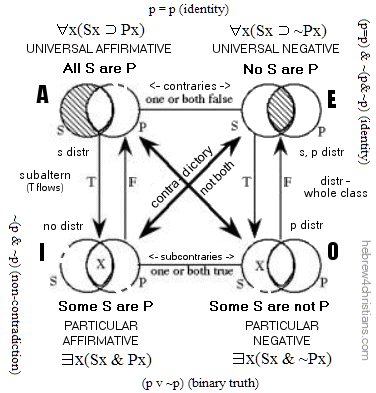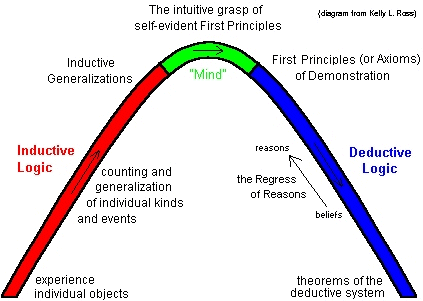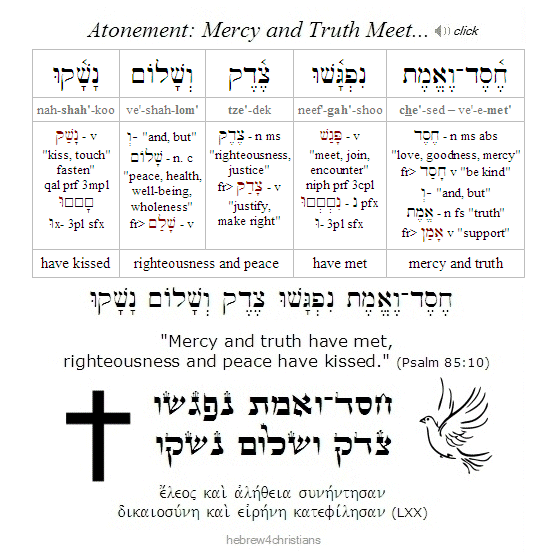|
THE APOSTLE PAUL SUMMARIZED THE MESSAGE of the gospel by means of four empirical propositions, namely: 1) that Messiah died for our sins according to the Scriptures; 2) that he was buried; 3) that he was raised on the third day according to the Scriptures; and 4) that he was seen alive by various eyewitnesses after his death (see 1 Cor. 15:1-8). Paul went on to argue that the reality of the resurrection is the center of salvation, for if Yeshua had not been raised from the dead, his repeated declarations that he would suffer, die, and come back to life would be untrue, and therefore we would still be captive to our sins. The great fact that Yeshua was indeed raised from the dead, however, demonstrates that his mission to redeem humanity was successful, and that death has been "swallowed up" by means of his victory over the curse of sin (1 Cor. 15:36). This is the core message that Paul regarded as being of "first importance" and essential to salvation.
Now if we take a moment to reflect on Paul's summary, we soon realize that he had made certain assumptions that were presupposed in his description of the essential gospel message. First, of course, is that his summary declaration appeals to the reliability and trustworthiness of the Jewish Scriptures (as clearly indicated by the repeated phrase "according to the Scriptures" (╬║╬▒ŽäßĮ░ ŽäßĮ░Žé ╬│Žü╬▒ŽåßĮ▒Žé). If someone were to question why they should believe what the Jewish Scriptures say, Paul would have had to provide "evidential reasons" for their authenticity, veracity, and credibility, since he couldn't just appeal to the Scriptures to establish their truth without begging the question. This in turn would have implied appealing to the historical experience of the Jewish people, including their origin as the descendants of the patriarchs Abraham, Isaac, and Jacob, their 400 year enslavement in Egypt, their deliverance from bondage during the Exodus, the awesome revelation of the Torah given at Mount Sinai, and so on.
As one trained in the learning of the Pharisees (Acts 22:3), it is likely Paul would have retold the grand narrative of the Jewish Scriptures, beginning with the creation of Adam and Eve, their transgression and exile from the original paradise, and the subsequent degeneracy of the human race. Paul would have explained the deliverance of Noah from the worldwide judgment of the flood and the subsequent genealogy of Noah's sons culminating in the advent of Abraham, the first patriarch of the Jewish people. The history of Abraham, Isaac, and Jacob would be retold particularly in relation to the oath of blessing and the divine promise regarding the coming "Seed" (i.e., descendant) who would be the Heir and Savior of the world. Paul would then have reviewed the history of the Israelites and their deliverance from slavery in Egypt under Moses, the giving of the law code and the covenant at Sinai, the vision and establishment of the Tabernacle (and later the Temple in Jerusalem), and so on. Throughout his historical review Paul would have focused on how Yeshua fulfilled the prophetic promises of God regarding the coming of the Messiah, quoting from the Torah, the Writings, and the various prophets of Israel. Moreover Paul would have appealed to the great oral tradition of the tzaddikim, the faithful ones of Israel, who were eagerly awaiting the coming of the Messiah. If someone persisted to question the truth of the testimony of Scripture, it is likely Paul would have appealed to the meticulous scribal traditions of Israel, how the texts were scrupulously preserved for millennia using the most rigorous of standards of scribal transmission (soferut), and so on. Regarding the identity of Israel's promised Messiah, Paul would have appealed to the various prophetic witnesses recorded in Scripture, words from Abraham, Jacob, Moses, King David, Isaiah, Jeremiah (among others), as well as eyewitness reports regarding the miracles of Yeshua, including his own personal encounter with the risen Lord on the road to Damascus (Acts 9:3-19; Acts 26:12-18; Gal. 1:11-16; Phil. 3:3-7; Acts 17:17). Paul also would have appealed to extra-biblical sources of confirmation of the testimony, such as historical accounts of the life of Yeshua by his contemporaries, including accounts provided by the Jewish Sanhedrin and Roman officials regarding his crucifixion. In addition, Paul would have provided logical reasons for faith, including the argument from creation (Acts 17:24-28; Rom. 1:20), arguments from moral experience and conscience (Rom. 2:14-15; 2 Cor. 5:11), and arguments from intuitive awareness of God's existence as the first cause of existence (Rom. 1:18-20; Acts 17:28). It was Paul's custom to reason with his fellow Jews from the Scriptures regarding the truth of the gospel message (Acts 17:2, Acts 18:4), but to Gentiles who did not know the Torah he used logic, appeals to empirical fact, common religious sentiment, and sometimes philosophical reasoning to make his case for the truth of special revelation (Col 2.8; 1 Cor. 9:22; Eph. 4:17-24).
Concerning the more philosophical approach, Paul would have argued on behalf of basic monotheistic personalism, that is, the idea that there is one (and only one) God who is a omniscient (all-knowing), omnipotent (all-powerful), omnibenevolent (all-good), and who is the Source of all moral truth (Deut. 6:4-6; Psalm 139:17; Psalm 78:41, etc.). As the Supreme Being, God is One (not two or more) and the universe is a "creature" brought into existence yesh me'ayin, "out of nothing," that is, by an act of God's sovereign will. God is transcendent over creation yet immanent within its sustenance (Heb. 1:3; Col. 1:16-17, John 1:3; Rom. 11:36). This implies that reality is "two-tiered," composed of both material and spiritual dimensions, though humanity is thought to bridge both realms by being a physical creation endowed with a spiritual soul. God is reveal in "anthropomorphic" terms because human beings are made in the divine image and likeness (Gen. 1:26), and the spiritual is discerned through analogy with the physical (2 Cor. 2:11-13). The spiritual realm is revealed by God in two primary ways: 1) by general revelation (i.e., intuitive awareness of first principles of reason and logic that God exists and is the source of reality, see Rom. 1:19-20; Acts 14:17; Psalm 19:1, etc.) and 2) by special revelation (i.e., God interacting with select individuals in history who were entrusted to preserve and proclaim his message to others, see Deut. 4:7-8; Psalm 103:7; 147:19-20; John 4:22; Rom. 3:1-2; 9:4, etc.). Those narratives and words of special revelation esteemed as Scripture provide a semantic matrix for understanding the human condition of alienation, suffering, and the problem of death, apart from which the gospel message cannot be understood or proclaimed. For instance, the revelation at Sinai to the Jewish people distills and enshrines both the moral imperatives of human conscience as well as the need for blood atonement and deliverance from the guilt of sin (Lev. 17:11). The "korban principle" of "life-for-life" vicarious substitution was prefigured in the primordial garden (Gen. 3:21), symbolized in the sacrifice of Isaac (Gen. 22; Heb. 11:19), foretold in the Passover sacrifice of the lamb of God (Exod. 12:21-27), enshrined in the sacrificial system of the Mishkan by the "korban tamid," or daily offering, of the lamb (Num. 28:1-8); dramatized in the elaborate Yom Kippur ritual that culminated with the sacrificial blood being put over the broken tablets of the law in the holiest place (Lev. 16; Heb. 9), and so on. All of these special revelations signified the coming Redeemer of Israel, the great Lamb of God who takes away the sins of the world (John 1:29).
 |
The advent of "God in the flesh," that is, incarnation of Yeshua, however, is the climax of all special revelation, the ultimate "Word of God" (John 1:1-14). Yeshua, who is fully God and the Creator of the universe (John 1:1-3; Col. 1:15-17; Heb. 1:3; Isa. 44:6; Rev. 22:13, etc.), emptied himself of all regal glory by clothing himself in human flesh to become the "Second Adam" and the atoning sacrifice for the fallen human race (Phil. 2:7; 2 Cor. 8:9; Rom. 8:3). Yeshua was "born to die" as humanity's exchange (1 Cor. 15:45; 2 Cor. 5:21). The "deeper truth" of grace is thereby revealed: because of Yeshua's intercession, the verdict of the law is overcome by God's mercy and yet God is both fully just (in upholding the verdict of the law) yet the justifier of the ungodly who trusts in the divine work of deliverance given in Messiah (Rom. 3:26; Psalm 85:10; John 1:17). The resurrection further reveals not only that Yeshua died for our sins but that his sacrifice was fully accepted for our atonement. Faith in his sacrifice for your sins means you trust that his blood was shed for you, that his resurrection means that he is alive, your Living God, Redeemer, and Savior.
Followers of Yeshua are commanded to love the truth and to think clearly about their faith. Salvation has centers on the truth of God and his superabundant righteousness in saving and imparting a new nature within his redeemed people (ūÖų░ū®ūüūĢų╝ūóųĖū¬ųĖūö ū£ųĘūÖūöūĢųĖūö). Those who reject or deny the truth remain in a state of spiritual death (John 3:36; 1 John 5:12; Psalm 78:22; Heb. 3:18), as it says in our Scriptures, "people perish because they refused to love the truth and so be saved" (2 Thess. 5:10). Genuine faith, then, does not think Yeshua is merely "a" way to know God, but rather "the" way - exclusively - and that salvation is found in no other (John 14:6; Acts 4:12; 1 Tim. 2:5; John 11:25). The truth claims of Messiah are exclusive and absolute to those who trust in Him, and therefore the love of truth is integral to followers of Messiah. Indeed, the word of truth (ŽäßĮĖ╬Į ╬╗ßĮ╣╬│╬┐╬Į Žäß┐åŽé ß╝Ć╬╗╬Ę╬Ė╬ĄßĮĘ╬▒Žé) is a synonym for the "gospel of salvation" itself (Eph. 1:13; Col. 1:5; James 1:18). God commands all people to believe this truth (Acts 17:30-31; 1 Tim. 2:4) and therefore we regard truth of God to be central to salvation itself. Other worldviews or "totalizing" philosophies that do not embrace the truth of Messiah of Israel are therefore regarded as being insufficient for being rightly related to reality...
Atheism, for example, expresses the denial of any form of "theism" (i.e., belief in any God or the existence of any "numinous" realm), though in the Western world atheism generally expresses the rejection of the monotheistic personalism of Judaism and Christianity, claiming that human reason justifies this presupposition (or at least provides rational warrant for rejecting belief in a Supreme Being). Of course categorical atheism is an arrogant doctrine since it requires godlike powers to claim there are no godlike powers. Materialistic (or naturalistic) atheism further implies that human freedom and ontological possibilities are illusory, since the universe is a "closed system" of atomic space-time events that are governed by "laws of nature." Materialistic atheism suffers from the epistemological deficiency of being unable to explain how the mind can transcend a closed causal system in the first place, however. In short, atheism is a faith-based system with a number of metaphysical assumptions and "religious" dogmas, including the idea that something can comes from absolutely nothing; that mind mysteriously "evolves" from matter; that knowledge of an external world is possible; that it is "better" to know than to not know; that language systems (including mathematics) "refer" to things in an external world that are measurable; that the future will uniformly resemble the past; that the laws of logic preserve truth, and so on. Most forms of atheism deny the idea of a Supreme Being defined as "all-knowing, all-powerful, and all-good" because this seems inconsistent the prevalence of evil in the world, though of course atheism cannot intelligibly use the term "evil" (or "good" for that matter) given its entirely "naturalistic" metaphysical assumptions... Tragically, however, and despite the fantastic and "romantic" visions of a scientific utopia and a cosmological future involving deep space exploration, the ultimate "eschatology" of the faith of atheism is overcome by the inevitability of "heat death," wherein all things eventually will fritter away (by entropy) into the abyss. There is no life after death; there is no answer to the meaning of life; all ideals of beauty, love, and hope are illusions; and ultimately everything is inscrutable darkness and vanity in the end.
Most honest thinkers eventually realize that atheism is a dead-end philosophically, and therefore they resort to a modified version that merely claims that the existence of a Supreme Being is unlikely, or at least beyond the realm of human knowledge, by inferring (fallaciously) that since the nothing of God (or ultimate reality) may be known, therefore something about God (or ultimate reality) may be known. Logically speaking, the starting point for agnosticism is self-contradictory. To see this, suppose knowledge is impossible (~k); then knowledge is possible, for the knowledge that knowledge is not possible is a type of knowledge (~k -> k). However, since k and ~k cannot both be true, the key assumption of agnosticism is to be rejected (reductio ad absurdum). Like cosmological atheism, agnosticism is ultimately "unlivewithable" as a coherent vision of reality, leaving the most important questions, values, and hopes of the heart entirely unanswered.
 |
Deism is the view that God is an "uninvolved" first cause of universe. God created the world and all that is in it, but then let it operate without his intervention, according to "natural" laws that he established for its operation. In that sense, deism does not regard God as "personal" as much as "mechanistic." God is entirely transcendent, "wholly other," and not "immanent" within creation (i.e., operating in its sphere) and therefore "miracles" are impossible (by definition) because they violate the divinely established natural order (i.e., "machinery"). Since nature is a closed system of cause and effect, freedom is illusory, and evil is a by-product world forces.
Deism, like atheism, arrogantly assumes godlike knowledge (omniscience) to claim that its premises are true. Moreover, deism does not remedy the problem of sin and death for us, since a God who is wholly transcendent is practically unconcerned with the human condition. There is no place for "wonder" or mystery in life either, because the realm of the numinous (spiritual) is essentially reduced to that of the natural. However it should be understood that a deist cannot logically argue that miracles are impossible without begging the question. To say, "It is impossible to know if miracles occur; therefore miracles do not occur" is an argument from ignorance (argumentum ad ignorantiam), since from an unknown a known cannot be validly inferred. The contrary claim: "It is impossible to know that miracles do not occur; therefore miracles occur" is equally fallacious.... Therefore you simply cannot argue "a priori" that miracles are impossible but must examine historical evidence and eyewitness testimonials to ascertain what did (or did not) take place. In the case of the intervention of God in space-time in the life of Jesus of Nazareth, for example, we must look at the historical records to consider their trustworthiness, authenticity, and credibility. The testimony of those who actually knew Jesus claimed that he was the Messiah of Israel, the Savior of humanity, and various titles and ascriptions of deity were exclusively applied to him. Yeshua himself testified that he was divine and demonstrated his message with public miracles and evidences of divine power. Moreover he appealed to prophetic witnesses concerning his identity, saying that both Abraham, Moses, and the other prophets foretold his coming. Indeed various prophecies foretelling the life of Messiah were fulfilled in him, adding credibility to his testimony that he was indeed God the Son. The testimony of those who encountered him after his death, burial, and resurrection also must be investigated for their credibility, as well as the testimonies of those who were their contemporaries. The phenomena of prophecy must be examined and the claims of fulfilled prophecies carefully evaluated. Entire books have been written on the topic of "evidential" apologetics that provide empirical evidence to establish the credibility and trustworthiness of the New Testament Scriptures.
Pantheism, or the notion that "everything is God," is the opposite of deism, supposing that the divine is wholly immanent and not transcendent (or that any sort of transcendence is really just another form of immanence). God is "nature," and therefore God is the metaphysical source of all that exists -- the mystical center of all being -- the unchangingly real that is the substance of all seeming change. Reality is "one" in the sense that it is a unity that only apparently suggests particularity, since at bottom all things are connected and are aspects of a deeper monistic whole. The realm of the physical is therefore illusory as is the realm of the spiritual, since all things resolve into an oneness that is indefinable and unknowable. Human judgments such as "good" and "evil" are subjective and not absolute, and this homogenization goes "beyond" moral or aesthetic categories to blend into a deeper whole that somehow reconciles all distinctions and differences (e.g., Hinduism, Taoism). Buddhism is a "humanistic" form of pantheism that regards the human ego as illusory since it implies differentiation. Freedom from the "wheel of suffering" (i.e., moksha in Hinduism, nirvana in Buddhism) is a form of unconsciousness and nothingness, and therefore "salvation" is deliverance from rebirth and attachment, though nothing can be known or said about this, for it is neti neti, "not this, not that", or "neither this, nor that," which implies the negation of individuation, consciousness, desire, and of life itself.
 |
My purpose here is not to discuss various "worldviews" in depth but to simply indicate that Paul's basic summary about the gospel is grounded in the assumption that there is one God who is a Person, who is both infinitely transcendent and infinitely immanent, the Creator and Source of reality - physical, moral, and spiritual - who reveals himself in nature (by means of logic) and by special revelation (by means of divine encounter). In particular, this God has revealed himself to the Jewish people as YHVH (ūÖūöūĢūö), the necessary and sufficient cause of all that exists, the Master of all possible worlds, the Creator of humanity who has a Name and who has designed creation to be knowable. That mankind was created be'tzelem Elohim, in God's image, means that logic and correspondence are "hard wired" into all thinking whatsoever, somewhat like Immanuel Kant's description of the "categories" of pure reason that provide justification for transcendental knowledge claims and the very possibility of knowledge of any kind. Logic is meaningful, truth exists, reality is knowable, love is real -- because they are all grounded in the Mind and Being of God who created human beings in the divine image and likeness....
So going back to our original topic of what the gospel means according to Paul, we have noted some of the assumptions at work in his thinking, showing that Paul relied on the testimony of both logic and empirical evidence to infer that the LORD, the God of Creation, created mankind with the ability to apprehend divine truth in a propositional and cognitive sense, and to distinguish between truth and falsity by means of logical principles that are presupposed in any thought whatsoever. God also endowed mankind with an intuitive sense of right and wrong (i.e., a conscience) and a sense of moral obligation for the welfare of others. Within the human heart is an incurable need for healing, love and eternal life, and nothing less than that can truly satisfy the existential pathos and yearning of the soul. To the atheist (and agnostic) Paul would appeal to foundational truths and axioms that are preconditions for any knowledge whatsoever, and he then would demonstrate that the knowledge of God is intuitively known and assumed in all valuations of experience. Moral truth is essential for human society, and principles of justice are transcendental categories of all judgments of value. To the deist Paul would likewise argue that moral imperatives and obligations are grounded in God's Presence, and that divine providence implies awareness and concern for the immanent. Moreover the only way to determine whether the miraculous is possible is to empirically investigate the miraculous claims. Paul's vision on the road to Damascus was witnessed by others who were with him, and this vision radically publicly transformed his life. We could therefore offer a simple modus tollens argument: 1) If deism is true then miracles are not possible (i.e., d -> -m); but 2) miracles are possible (i.e., m); therefore 3) deism is not true (i.e., -d). As for pantheists, dualists, polytheists, animists, idol worshippers, (i.e., all those who believe in a spiritual realm to existence), Paul would first appeal to their inescapable dependence on logic to communicate, and then he would engage them in dialog about the language used to describe both physical reality (i.e., the meaning of sense experience and the external world) and ideal reality (i.e., the meaning of mathematical truth and moral, ideals of justice, love, and unending life). As a Jew Paul would appeal to Jewish history and the corporate testimony of the miraculous to substantiate the exclusive claims of the God of Israel. The problem of sin and death and the need for deliverance from judgment for sin (i.e., salvation) given in Yeshua would force existential decisions about what may be trusted regarding the realm of the spiritual world and the end of all things...
The existence of the Jewish people and their story as told in the Torah of Moses is central to the gospel message, since it provides the context for the Gospel of salvation in Yeshua. Ours is a historical faith, based on historical events, and therefore it is rationally subject to the investigation of historical facts. Now the resurrection of Yeshua from the dead is the central claim of Christian faith, and Paul plainly stated that "if Christ has not been raised, your faith is futile and you are still in your sins" (1 Cor. 15:17). Yeshua was "delivered for our offences and was raised again for our justification" (Rom. 4:25). Evidence for the reality of the resurrection includes multiple eyewitness reports and testimonials that Yeshua is alive (1 Cor. 15:5-8), and that includes the character transformation of the first followers of Yeshua who willingly died as martyrs for the sake of their conviction. The revolution of the disciples from being a fearful people to those willing to die for their faith is best explained by their encounter of Yeshua after he was known to have been crucified and buried in a tomb. Now this argument is not a deductive one, of course, since it is based on empirical matters and experiences, and therefore it constitutes an inductive inference to the best explanation to conclude that Yeshua rose from the dead best accounts for all of the facts. The reality of the historical life of Yeshua, his death by crucifixion, his burial in a tomb, and the account of his post-mortem appearances to the disciples are not seriously questioned by scholars who have studied the evidence, though the significance of these facts may be a matter of debate.
Paul's argument is that the resurrection of Yeshua from the dead is the most logical explanation, especially in light of the prophecies and foreshadowing revealed in the Jewish Scriptures. Undoubtedly Paul would have emphasized the great promise of God to redeem humanity as the central aspect of the idea of "salvation," though he would have explained how the Torah foretold and prefigured how the "Messiah died for our sins according to the Scriptures." This would mean that Paul would have explained the various "prophetic pictures" of the cross given in the Old Testament, including the original sacrifice of the lamb in the garden, the substitution of the lamb for Isaac, the blood of the lamb used during the Passover in Egypt, Moses' vision of the altar (i.e., sacrificial system) with the daily sacrifice of the lamb with wine and bread, and so on, as I have indicated above.
Likewise Paul would have explained that the sacrifices at the Tabernacle were provisionally given for the restitution of sin and cleansing from guilt, as well as to demonstrate the "life for life" concept of vicarious atonement. The trusting sinner would place his hands upon the head of a sacrificial animal, confessing his sin, while the animal was slaughtered in his place. The great Day of Atonement ritual illustrated how the sprinkling of sacrificial blood over the tablets of the law in the holiest place of the Tabernacle prefigured and foretold of the cross of Messiah and how his blood purifies us from sin (Col. 2:14). Paul would have explained how Yeshua became a curse for us and that God had "made the one who did not know sin to be sin for us, so that in him we would become the righteousness of God" (Gal. 3:13; 2 Cor. 5:12; 1 Pet. 3:18). At the cross of Messiah truth (i.e., the verdict of the law) and mercy for the sinner met and were finally reconciled and eternal atonement was secured (Psalm 85:10; Heb. 9:12-15). The cross reveals the mystery of the divine heart - the passion and inner meaning of God's great wound suffered for us to be made whole and restored to life. The resurrection of Yeshua vindicated God's righteousness by justifying those who put their trust in Yeshua as the atoning sacrifice for their sins. The cross both establishes God's inviolable holiness and absolute regard for the truth while extending his compassion to those who trust in his salvation (Rom. 3:26). When an earthly judge pardons an offender, the verdict and penalty of the law is set aside, though not so with the LORD, who affirms the truth of justice by giving his Son over to a shameful death to pay the penalty for the offense. God is therefore both entirely just yet the justifier of all those who trust in his redemption made for them.
 |
It should be clear that Paul's apologetic approach relies heavily on the special revelation of God given to the Jewish people as recorded in the Old Testament Scriptures (i.e., the Tanakh: Torah, Neviim, and Ketuvim), by means of which he grounded and contextualized the message of the gospel: "For I delivered to you as of first importance what I also received: that Messiah died for our sins according to the Scriptures, that he was buried, that he was raised on the third day according to the Scriptures" (1 Cor. 15:3-4). Likewise among the first things Yeshua did after his resurrection was to explain how the Jewish Scriptures testified and validated his work of salvation: "Then beginning with Moses and all the prophets, he interpreted to them the things written about himself in all the Scriptures" (Luke 24:27). When he appeared to the disciples some time later he again said: "This is what I meant when I spoke to you saying that everything written about me in the law of Moses and the prophets and the psalms must be fulfilled" (Luke 24:44). Yeshua had earlier explained to his disciples that his mission was to suffer and die as the Lamb of God (see Matt. 16:21; Matt. 26:2; Luke 9:22; Mark 8:31, etc.), and he declared that both Abraham foresaw his coming (John 8:56), Moses wrote of him (John 5:46), and that the prophets foretold his sufferings (Matt. 13:17; Matt. 25:54-56; Acts 13:27, 1 Pet. 1:10; Rom. 3:21; John 1:45; Isa. 7:14; 9:6; 53; Psalm 22; etc.). When Paul later wrote to the Gentile churches, "All Scripture is breathed out by God and profitable for teaching, for reproof, for correction, and for training in righteousness, that the man of God may be competent, equipped for every good work" (2 Tim 3:16-17), he was of course referring to the Jewish Scriptures, since the New Testament had not yet been compiled for the primordial church. How important, then, are the "Jewish roots" of the Gospel message, for without the context of the Torah, the ministry of Yeshua would be nearly inexplicable!
When the "thief on the cross" believed in Yeshua's goodness and affirmed that He would be vindicated by God, he said: "Lord, remember me when you are in the kingdom." Yeshua then replied, "Truly, I say to you, today you will be with me in Paradise" (Luke 23:42-43). Faith in the resurrection and vindication of Yeshua seems to be the absolute minimum yet entirely sufficient condition for salvation, somewhat similar to the account in the Torah of those who looked upon the serpent mounted upon the staff found healing (Num. 24:4-9). "Just as Moses lifted up the serpent in the wilderness, so must the Son of Man be lifted up, so that everyone who believes in him may have eternal life" (John 3:14-15). The Torah of the "thief on the cross" teaches that no "religion" will suffice; no ritual act will propitiate, but simply the confession of our need as we look to the One who delivers our soul from death. On the other hand, consider the religious experts and "teachers of the law" of Yeshua's day who denounced him and spurned his redemptive message. Yeshua minced no words castigating their hardness of heart and rebuking them for not knowing the "time of visitation" (ŽäßĮĖ╬Į ╬║╬▒╬╣ŽüßĮĖ╬Į Žäß┐åŽé ß╝ÉŽĆ╬╣Žā╬║╬┐ŽĆß┐åŽé) of the LORD (Luke 19:44; Dan. 9:24-26).
The message of the cross of Messiah is that God regards you as personally worth dying for, and indeed, that your life is worth the exchange of His own... You are treasured; you are loved. This is of first importance: "For God so loved the world, that he gave his only Son, that whoever believes in him should not perish but have eternal life" (John 3:16).
Your Heavenly Father sees in secret... "The deepest thing in our nature is this region of heart in which we dwell alone with our willingnesses and our unwillingnesses, our faiths and our fears" (William James). It is there, in the secret place of the heart, that the sound of the "knock" is either heard or disregarded (Rev 3:20). May the Lord give us the willingness to do His will and the courage to believe in His love. And may God deliver us from doubt and from every other fear. May we all be strong in faith, not staggering over the promises, but giving glory to God for the miracle of Yeshua our LORD. May we all be rooted and grounded in love so that we are empowered to apprehend the very "breadth and length and height and depth" of the love of God given to us in Messiah, so that we shall all be filled with all the fullness of God. Amen...
"I am the resurrection and the life. Whoever believes in me, though he die, yet shall he live, and everyone who lives and believes in me shall never die. Do you believe this?" (John 11:25-26). We are healed from the "sickness unto death," that is, the lethal condition of spiritual death, not by our own personal righteousness or wisdom, but by the miracle of God, a supernatural intervention that does not derive from anything within ourselves. We come into this world spiritually "still born," and unless we receive the miracle of life from above, we remain spiritually cut off, dead while seemingly alive, a shadowy consciousness trapped in illusion... True life is given in relationship with Yeshua, for apart from him we can do nothing (John 15:5). Therefore we must first believe God for the blessing, since we are powerless to change or heal ourselves (Job 14:14). When we turn to God in brokenness, confessing the truth of our need for deliverance, appealing to the life given in exchange for our own, we begin to come alive. "It is no longer 'I' who live; your true life is "hidden" with God, and what is most real about you is part of the unseen realm (Gal. 2:20-21; Col. 3:1-5; 2 Cor. 5:17). Faith is a matter of "catching up" with the miracle. Pride recoils at these considerations because it always insinuates that there is something we must do to commend ourselves before God. Yet even faith itself is a gift, so all that remains is for us to live in the light of truth, accepting the blessing even in the midst of the world system and its practiced darkness. This all sounds so simple, yet that is because we focus on the words rather than the power of the words; we look at what appears rather than the deeper substance the words signify...
 |
Some Related Topics:
|






